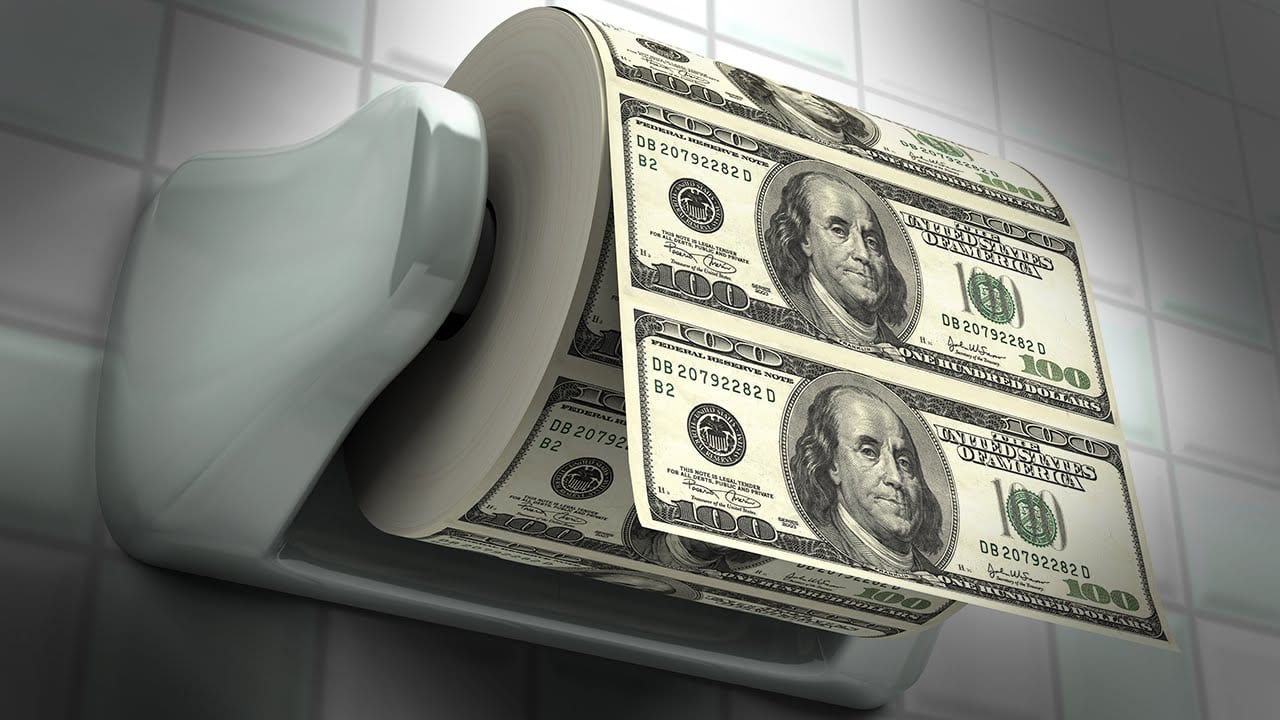
Fiat Cash: The Source Of Problems
Updated June 2023
The best way to tackle the fiat issue is by tracing its history. The evidence is clear: the dollar’s purchasing power has steadily declined. History is rife with lessons, showing the perils of not learning from the past. After reading this, you’ll be struck by the unsettling notion that the Fed’s ultimate goal is to take from both Peter and Paul to cater to the well-fed Fat Johnny – a metaphor for bankers.
Unveiling the Fiat Problem: A Historical Perspective
There is a great debate within economics about the nature of currency. This debate has continued since tokens were first traded for goods and services. The argument is whether a sound currency must be backed by tangible commodities such as gold or should be virtual tokens of exchange. These tokens of business are called fiat currency. All modern national currencies are fiat. They do not represent any fixed quantity of goods or services
and the marketplace sets their value. Fiat currencies are like stocks, but currencies are stocks of countries, not companies. Unlike stocks, currencies tend to go down in value rather than up. It is unsettling to many people that the value of their money is so ephemeral. Is Fiat cash inherently unstable, and should the world return to tangible money?
All currencies perform three essential functions:
- a medium of exchange for making economic transactions
- a benchmark of value for determining the relative importance of goods and services
- a store of value for future transactions
Both fiat currencies and commodity currencies such as gold perform all three functions but with varying effectiveness.
Fiat cash is superb as a medium of exchange. Fiat cash is the most convenient and liquid means of settling transactions since they can take many forms, such as paper, plastic, or electronic. Gold and other commodities are bulky and impede efficient transactions. Fiat currencies offer friction-free transaction settlements that allow economies to grow at the maximum rate.
In contrast, commodity money is far more effective than Fiat Cash as a store of value. Consequently, commodity money also performs better than fiat as a value benchmark. History has shown that Fiat cash erodes in value over time and ultimately becomes worthless due to governments’ excessive production of new money. Although the purchasing power of commodities can vary over time, they always retain value because the quantity of any commodity is always limited. Is there a way to make Fiat cash stable and reliable stores of value? And is there any way to make commodity currencies more convenient?
One way would be to define all currencies as tokens representing a base commodity. During the classical “gold standard” era, paper money was gold-backed. The government issued paper money, but with the promise that it could be redeemed at any time with a specific weight in gold. This compromise between fiat cash and commodity money gave the best of both worlds, offering the convenience of Fiat cash and the reliability of gold. This arrangement worked quite well for many years—currencies with a strong gold backing retained stable value over long periods.
Questioning the Gold Promise: Governments, Fiat Currency, and the Illusion of Value
Unfortunately, a promise to redeem gold for paper is just a promise. Governments are notorious for breaking promises and every gold-backed currency in the world was ultimately repudiated. Governments have always succumbed to the temptation of printing more money than gold. At some point, the currency collapses, leaving the government and its currency bankrupt. It seems that gold-backed currencies are just a form of Fiat cash. A piece of paper always has a net worth of zero in the end.
If governments cannot be trusted, then maybe the private marketplace should take over the issuance of currency. This was also tried by allowing banks to issue their notes. But bank-issued currencies were a greater failure than government issues. When people are allowed to print money, greed and politics ultimately produce prodigious money and eventual loss. Money printing is just too irresistible because it offers something for nothing.
Money printing gives the illusion of increased prosperity, but it is only the theft of value from all other currency holders. The total value of an economy is always limited by its ability to produce goods and services. Any increase in the money supply above economic growth will ultimately show up as inflation, a decrease in the value of money.
Preserving Wealth: Exploring the Fiat Cash Dilemma and Strategies for Stability
It isn’t easy to believe that governments will return to a commodity standard for currency. There is no political constituency for honest money and enormous pressure to inflate. We can assume that the long-term deterioration of all currencies will continue indefinitely. Therefore, people with wealth in the form of currency must pursue an investment program to preserve their wealth. A currency diversification strategy is appropriate if we consider currencies country-specific stocks. Diversification should include several national solid currencies and gold and silver bullion as the commodity currency allocation. Such a program should be considered a wealth preservation strategy rather than wealth enhancement. The goal of wealth in the form of currency is stable value and liquidity.
We can hope that someday, governments will be forced by their citizens to manage their currencies honestly. But this assumes an honest and vigilant citizenry. In the end, we get what we want from our governments. People want inflation. They want their wages to go up, their homes to go up, and their stocks to go up. If this means that the money becomes worthless, then so be it. The government always responds cheerfully to the people’s will through the printing press’s magic.
© 2004 George J. Paulos
Editor/Publisher
Alternatives for Financial Freedom
Proprietor, www.freebuck.com
Editor, The Gold Letter
Email
Sol Palha
Proprietor
www.tacticalinvestor.com
Exploring the Fascinating Realm of Fiat Currency
Who is rich? He is content. Who is that? Nobody.
Benjamin Franklin (1706 – 1790)
Fiat currency is not as evil or nefarious as it is made out to be. Anthropologists have demonstrated that throughout history, there have been many occasions where some form of fiat was used. Some examples are seashells and animal teeth. Granted, one could not print them with a press, but they could be picked up from the beach or obtained by killing more animals. Problems always arose because the medium of exchange could be created at will. The only difference is that the process was not localized to one group of individuals as it is now.
That is why, at some point in time, gold was used. Gold ties the hands of the central bankers, preventing them from creating money at will. The same effect could be achieved with a head standard. This standard would ensure that any central banker who made new money without the consensus of the majority was decapitated on the spot (the majority being the masses and not the bankers). In this way, we would never have a problem balancing the budget or have too many dollars circulating the globe.
Fiat Cash Monopoly: Unveiling the Mechanisms of Currency Creation and Control
Fiat currency creation is a monopoly, and we have no say in it. The Feds answer to no one but themselves. They are not even part of the government and effectively now control the Government. I will put up an excerpt below to explain my next point.
The key is that when loans are made, they are not made with the same money brought into the bank as deposits. They arise out of newly created money. The deposits remain in the bank’s ledger under liabilities but are money to the depositors. If a depositor puts $100 into the bank as a deposit, he has $100 in chequebook money. However, the bank uses that as the basis for making loans ($70 in the case of your father’s bank). So, now there is a total of $170 in the economy, whereas there had been only $100 before.
The action does not stop there. The $70 loan quickly becomes another deposit and, as such, is the basis for another loan ($49 in the case of your father’s bank). There is $219 in the economy instead of the original $100. The $49 becomes yet another deposit — and the process continues until it plays itself out at about seven or eight round trips.
http://www.realityzone.com/mrgriflet.html
The Fiat Currency Conundrum: Money Creation, Inflation, and Disparities in Power
Not only do the Feds create money at will and out of thin air, but regular banks have gotten into the act, too. Then you have credit card companies extending credit and assigning vast lines of credit to individuals without the backing of Gold. This boils down to the same thing: creating new money out of thin air. If we all had this ability to make money out of thin air magically, then fiat would not be such a bad thing. We would all basically be in the same boat. If prices rose, we would all–technically–be able to print more dollars and pay for the price increases.
However, the problem is that only a few individuals have this power, and so when they inflate, the average person is robbed blindly as his salary does not keep up with this inflation. A few people can get wealthy, while most are left to rot and die. Inflation is evil because its benefits and adverse effects are not spread out uniformly.
Annual income twenty pounds, annual expenditure nineteen six, result happiness.
The annual income of twenty pounds, annual expenditure of twenty pounds ought and six, result misery.
Charles Dickens(1812 – 1870), David Copperfield, 1849
In Conclusion: The Intricacies of Fiat Currency
Fiat cash is not the culprit or the problem; human nature is. It is in our nature to get more for less and then try to take it all without paying a cent, resulting in untold misery and suffering. If there were a way to tie the hands of the Feds, regular banks and all houses that issue credit, we would not be in such a mess right now. Because of this massive flaw in nature, a limiting agent such as Gold is needed to tie our hands. Perhaps one day, we will advance to the point where not just a few can decide the outcome of many.
Ultimately, things would be much better if the masses were correctly educated and allowed to be part of the decision-making process when creating new money. A simple election process once a year could be held to determine if more money should be made. Before this stage, everyone must be familiar with Austrian economics and Sound money management principles.
The chance of something like this happening anytime soon is one in a trillion. So, there can be only one solution: back all fiat cash with Silver and Gold.
All change is not growth, as all movement is not forward.
Ellen Glasgow
Chris Sanders
Principal, SandersResearch.com
Buy others for news. Buy us for judgment.
Examining the Pros and Cons of Fiat Currency: Is It Really All That Bad?
Is the real problem the monopoly that central banks have on the medium of exchange?
The world has lived with a pure fiat monetary system for thirty-three years since the US abandoned its commitment to exchange gold for dollars at a fixed exchange rate in 1971. That commitment, enshrined in the Bretton Woods Agreement of 1944, had the force of international law. The Bretton Woods system was something less than fully convertible since the commitment to exchange gold only existed at the government-to-government level and at the level of the national economy did not exist at all. Indeed, holding gold was prohibited for private individuals, a point I shall return to momentarily.
At the time, the abandonment of Bretton Woods was simply the latest in a long series of actions intended to create a workable unitary fiat monetary system. The creation of the Federal Reserve, the abandonment of gold in 1933 and the establishment of the Exchange Stabilization Fund in the same year, the creation on of the CIA in 1947 with the express authority to raise money outside the law, and the creation of government-controlled oligopolies in housing and heavy industry via the GSEs and the Pentagon respectively were all designed expressly to create an institutional framework to accomplish that end.
All these actions have in common–besides their purpose–is that they were all based on either illegal or deceptive foundations. The Federal Reserve is nominally a public company, but its equity was sold to the very men and institutions it was supposedly created to regulate and control. Roosevelt’s actions were tenuously based on the Trading with the Enemy Act of 1917. The gold contract was abrogated over a bank holiday so that no one could get their gold.
Fiat Cash Complexities: Unveiling Hidden Mechanisms and Alternative Visions
The ESF was set up expressly to operate in secret; it is exempt from any reporting to Congress and is answerable only to the president and the secretary of the Treasury. The CIA’s charter amounts to an act of law authorizing the breaking of the law at will and the ability to raise finance similarly. The creation of the GSEs was shrouded in ambiguity: Are they or are they not guaranteed by the government? This may be less relevant today, but it was crucial fifty years ago when private corporations could still go to the wall. And the Pentagon has been, since the early 60’s, a sink into which taxpayer dollars are poured to enrich contractors with guaranteed margins.
The surrender of the British Empire in 1944 at Bretton Woods, the collapse of the Soviet Union in 1989, and the adoption by the Chinese Communist Party of “liberal” capitalism have made the world economy a unitary dollar financial system–the significance of which is the absence of choice. Irrespective of how poorly managed or exploitative the administration of that system is, there is no alternative. The only government with the chutzpah to attempt to do so was that of Saddam Hussein, and the consequence was predictable.
Adopting a statistically significant segment of the world’s population of a gold-backed unit of account and reserves supported by sufficient armed force to protect that area would bring about the end of the Fiat cash system in a trice, historically speaking. The fact that the only organization talking about doing so is the World Islamic Conference may well inform the War on Terror. The combination of control of the world’s largest oil reserves and hard currency and lower taxes would be hard to beat.
The Fallacy of Fiat Currency: Challenging Notions of Inflation, Monopoly, and Freedom
It is sometimes posited that a little bit of inflation is not a bad thing or that Fiat Mone is not so bad, and the monopoly on money creation by the central bank is the problem. This is to misunderstand the issue altogether. Fiat cash can only exist under trust and an absence of freedom.
The Roosevelt administration criminalized gold ownership by equating it with a threat to national security, in effect abrogating constitutional guarantees of personal political and economic freedom. In today’s system, you are free to own gold but not to know how much of the national gold reserve is even there any more, never mind what the Exchange Stabilization Fund is doing to suppress the price. The question is not so much whether or not fiat currency is bad but whether the political and institutional accoutrements that go with it are tolerable. That is a personal decision. I believe Ben Franklin was asked what kind of government had been created after adopting the American Constitution. “A republic, if we can keep it,” or words to that effect was his answer.
Have we kept it?
© 2004 Chris Sanders
Principal, www.sandersresearch.com
Email
Gale Bullock
Proprietor, www.pgtigercat.com
Fun With Fiat: Exploring the Controversies Surrounding Fiat Cash
Is the real problem the monopoly that
Do central banks have on the medium of exchange? It’s the Pox Americana by the FED!
Entering Through Exit Only for Center Stage
Gold and Silver, aka Heavy Metal, not to be confused with Metallica or Evanescence, which are heavy metal rock bands, aren’t legal tender fiat paper funny money, and a Ponzi Shell Game. Nelson Hultberg describes our one-party political system as DemoPublican, a concept of one-party governance. The current Federal Reserve, aka the American Central Bank, has a synergistic or symbiotic role with Congress, as espoused by the author of The Creature from Jekyll Island, G. Edward Griffin. When one combines the concept of a DemoPublican one-party governance and the symbiosis to print money out of thin air for the politicos inside the Beltway, including the GSEs and the White House, the Creature becomes a nine-headed hydra Pox Americana, which aids and abets the politicos shredding the last vestiges of The Constitution and the Bill of Rights, the foundation stones of a once Republic.
Pre-emption, Playing God, Walking on Federal Reserve Notes from Off-Shore
Exclusively through legal tender fiat, the United States under Baby Bush II could invoke a pre-emptive strike against Iraq. Using legal tender fiat, could Congress be deceived, as they are the ultimate Ship of Fools? Through legal tender fiat paper money, Franklin Delano Raines possesses more power than God to inflate real estate values in the USA. Meanwhile, Mr. Greenspan evokes visions of the following Jesus Christ walking on a sea of paper One Dollar denominated Federal Reserve Notes, which are not Constitutionally Defined as 371.25 grains of fine silver, based on the Spanish Piece of Eight –
A central bank such as the Federal Reserve, based on the prototype of the Bank of England, under the House of Rothschild, can wage war, create all sorts of mischief, sink the Lusitania, profit from warfare and globalization, move American industry off-shore, and select target markets and professional groups for destruction to cover its tracks. Bankers profit from war. I believe that 700 sum odd and growing numbers of coffins draped with the Stars and Stripes returning from Iraq are the workings of a legal tender fiat monetary system gone mad. Coin clipping abounds!
When in Rome… Burn the Magna Carta! And Buy a few repos to spark the DOW!
This fiat cash system is responsible for not only financing an illegal war costing the blood of our American Youth but also financing the final destruction of The Republic through Unconstitutional Patriot Acts, Homeland Security (Gestapo), and the shredding of The Constitution, the Bill of Rights, and our justice system established by the Magna Carta from our English Heritage of Common Law and Jurisprudence. A central bank can manipulate free markets and select target groups for centralization, control, and profit-making, thus destroying an industry.
The Fun with Fiat is that the politicos and the bankers profit in their Ponzi Shell Game whilst they erode and steal the wealth of a People and a Nation. The ability of the FED to rig Wall Street by propping up the DOW and NASDAQ using repurchase agreements is well documented by the work of Mike Bolser in the www.gata.org and www.lemetropolecafe.com circle of friends. The workings of the Plunge Protection Team or the Working Group on Financial Markets are well-known and documented in online financial processes.
We are in the biggest real estate market bubble in economic history, using debt-backed mortgage instruments to finance the so-called increased wealth effects in housing and commercial property. Debt-backed real estate and debt-backed money and financial systems, in our view, are hazardous situations in the global scheme of things in Mr Greenspan’s financial house of cards.
Total Banking Consolidation Through a Controlled Burn
(Real Estate Recession… Or, the Full Blown Bastard Depression?)
Mr. Greenspan’s and Mr. Raines’ targeted destruction of the real estate valuation industry, which is now wrought with mortgage and realty appraisal fraud, will most likely be a curse on the American Landscape when the financial system melts down – imploding from one micro realty market to another, taking with it the banking system, which will be forced to merge and be taken over by the prominent players and banking families on Wall Street. However, that’s the plan under the prime directive, as I call it, which is identified by Larry Becraft, Jr., an attorney friend of mine down in Huntsville, Alabama. Becraft calls it total banking consolidation. This is the centralization of the banking industry, and I call it the prime directive of the Federal Reserve fractional reserve banking system, which can easily be accomplished upon a real estate implosion.
Gagged Pigs Don’t Squeal
One professional group targeted for destruction and centralization is the realty valuation gig or the realty valuation profession. The FED has infiltrated through professional realty valuation organizations and their management companies a cast of Goons, Buffoons, and Storm Troopers with links to the banking cartel, Wall Street, high-powered money on Wall Street, and the GSEs. The intent was to inflate the holy Be-Jesus out of American commercial and residential real estate values to support the FED, the GSEs, and the GSE money pump to Gay Paree, holding up the consumer as the US Economy.
To do that, they (the FED and its cronies) had to castrate the realty valuation profession through centralization and control under the mechanism of the 1989 FIRREA Act, which they did completely. Credit Scoring, AVMs (Alternative Valuation Models, now from Pakistan and India), drive-by appraisals, lender client coercion, and mind games (The Delphi Technique and Cognitive Dissonance) in the Appraisal Institute and its REAS (Real Estate Appraisal Services) akawww.aidirectconnection.com, the AI’s appraisal mis-management subsidiary, are all part of the plan, and the Fun with Fiat at the FED.
A Conflict of Interest So Bold and Blatant, Even Joseph Goebbels Would Blush!
REAS is owned by Charter One Financial Corporation and is based in Ohio, very close to the General Headquarters of the Appraisal Institute in Chicago, Illinois. REAS operates as a Gestapo. They crush honest appraisers who try to expose mortgage and appraisal fraud for Washington Mutual and their other big service lenders. REAS is owned by Charter One Financial Corporation, the USA’s 25th largest bank holding company. That, simply put, is a conflict of interest. Royal Bank of Scotland is in merger and acquisition negotiations with Charter One for a takeover to become the USA’s 8th largest bank holding company. The conflict of interest intensifies, yet no one in the general membership of the Appraisal Institute seems to give a Rat’s Behind, and indeed, the general public could care less!
Propaganda from the Appraisal Institute and its Propaganda Mechanism using the Delphi Scam or Technique and Cognitive Dissonance is excellent. The AI Membership at large are asleep at the switch, as are Ma and Pa Kettle on Main Street America, including their son Joe Six-Pack and their daughter Sally SUV… Folks don’t want to know what’s going on! Mention an overheated or over-built market, mortgage fraud, or appraisal fraud in connection with a realty valuation practice in the Appraisal Institute, and you find yourself on a very long Blacklist.
However, “Complacency is no reward.” – Chevalier Harry Schultz.
Complacency is never a reward… An ARM Pour Vous?
Understanding the money system and real estate as a professional and as a global markets guru who has learned Wall Street to protect my family’s wealth, when I hear the word Democracy substituted by Presidents and Politicians for The Republic, I cringe. I CRINGE when I look at “Ashcroft’s hellish vision” of concentration camps for citizens as documented by George Washington Law Professor Jonathan Turley. Are these debtors’ prisons for us when the collapse comes, or are they just the pretext of all those anti-patriots Mr. Ashcroft will round up, stripping away their Constitution and Bill of Rights? — Your guess is as good as mine!
However, I know that This Republic would be a much safer place to live if we had a sound monetary system that protected civil liberties, property, and the freedom suggested in our Founding Fathers’ documents, deeds, and actions. However, we don’t have sound money. We have lived with Fun with Fiat and the Creature from Jekyll Island since 1913 – it has destroyed at least 95% or more of the value of the Constitutional US Dollar at 371.25 grains of fine silver.
For the past 40 years, since the GSEs were created, the Creature, in conjunction with the GSEs, have used real estate as a leading mechanism for increased debt and the destruction of the American Monetary System. This debt will never be repaid. Some wealth effect, Mr. Goebbels….eh, I mean Greenspan! – you sure suckered in many Folks! Grin! That poppycock about the savings and benefits of ARMs takes the cake, Alan!
Unravelling the Federal Reserve: From ‘Fun with Fiat’ to Challenging Monetary Systems
Or, the Fed Ex solution to the Creature from Jekyll Island?
This is very satirically simple and doesn’t require a vote of Congress to abolish the FED since these Politicos are the consummate Ship of Fools and have no spine for The Republic anyway. You draft the current governors and their support staff, including Mr. Greenspan and all surviving ex-Governors from the FED, and put them in the Marines.
Two weeks of basic training should be enough since they have all that experience manipulating what were supposed to be free markets and money systems. Age isn’t a problem in today’s Marines – they want a few good men (and women!) We also need to toss in all of their economists as privates or the grunts to wait on the Governors and the Chairman – eh, Generals!
We will make all of the Governors 4-star generals and place a fifth star on the Chairman. Everyone gets fatigues, a pretty helmet, and voice communicators. They each get their own AK-47, a Colt 45 sidearm, and K-rations. We Fed Ex ’em all to the front lines in Iraq. Baby Bush II issued an Executive Order for all other American Troops to withdraw to the ships and air troop transports! One is never too old to die for one’s Country, are they?
The Denouement to a Nightmare
Over 700 American Families have learned that their Sons and Daughters WERE too young to die for their Country and This Republic. Until they understand the Fraud of the Federal Reserve fractional reserve banking system… their tears will never be understood in their Souls…. and in their Hearts. May God Bless the Quick and the Dead that they might see. May the Good Lord Bless This Republic so that we can get our Assets out of Hock from the Pawnbrokers and Charlatans of Monetary Destruction and the Monopolistic Banking Cartel!
Debt-backed money and real estate are merely the illusion of wealth and prosperity. Pre-emptive wars financed by the American central banking cartel must surely have the Founding Fathers of This Republic shaking their heads at what the Pox Americana can do.
© 2004 Gale Bullock
www.pgtigercat.com
Email
An Internet Version with Links will be available soon: http://www.pgtigercat.com/Bastille/FunFiat.htm.
Art Soukup
Fascinating Insights into Fiat Cash: Are We Having Fun Yet?
Art Soukup
I shall try not to be serious with the title of “Fun With Fiat” and an international readership. (I said, “TRY,” but don’t hold me to it.)
So let’s begin by first listing the questions: Is fiat currency all that bad? Is the real problem the monopoly that central banks have on the medium of exchange?
And now for the answers: (Yes, Yes), (No, No), (Yes, No), (No, Yes).
With the four possible ways to answer the above two questions, you have now enjoyed the fastest lecture on the planet, and it didn’t even Hurt. That’s because I have omitted the 8 Whys? the supporting commentaries between the questions and the answers.
We are having fun, and therefore, “we don’t need no stinking whys? facts, charts, history, future” to burden our brains. Just plug in your whys. And choose an answer set. Suppose that is too much work to muster up a couple of whys. Hopefully, the other Round Table writers will have sufficient explanations supporting all four possible combinations.
Unraveling the Whys of Fiat Cash: A Playful Approach to Understanding Currency
If they have not, then it is still O.K. Just Fake up a bunch of whys? (You need 8 of them.) and plug them in between the questions and the answers. Whatever eight reasons you plug in, you will ALWAYS SELECT only one solution set.
What is friendly and easy about this approach is the answer will always be right, regardless of what answer set happens to pop out!! WOW. Clear Eyes. Instant Truth. The fun reason for this is because of the definition of fiat cash provided below with a web link.
Noun 1. Fiat cash – money that the government declares to be legal tender although it cannot be converted into standard specie
Folding money, paper currency, paper money – currency issued by a government or central bank and consisting of printed paper that can circulate as a substitute for specie
http://www.thefreedictionary.com/fiat%20money
Here’s a fun game, let’s explore the “Whys?” behind fiat cash:
1. Why do governments declare fiat cash as legal tender?
2. Why is fiat cash not convertible into standard specie?
3. Why is paper currency considered a substitute for specie?
4. Why does the government have the authority to define fiat cash?
5. Why does government decree determine the value of fiat cash?
6. Why is fiat cash widely accepted as a medium of exchange?
7. Why do governments rely on fiat cash for economic transactions?
8. Why has the concept of fiat cash evolved over time?
Answer Set: The value and acceptance of fiat cash are established by government authority and public trust in its usage, even though it lacks intrinsic value or backing by physical assets.
Are we having fun yet?
Did you pick up on the fact that it “CANNOT” be converted into something called “STANDARD SPECIE”, and that fiat is a “SUBSTITUTE” for it?
Still not having fun? Well, replace the SUBS with the PROS, and your eyes become clearer, and you have a whole new meaning to ponder.
© 2004 Art Soukup
“In the land of the blind, the one-eyed man is king.”
Email
P.S. There is another answer outside the box, but that’s for another day.
Janice Dorn M.D., Ph.D.
Contributor
www.tacticalinvestor.com
The Last Great Taboo
We might make a public moan in the newspapers about the decay of conscience, but in private conversation, no matter what crimes a man may have committed or how cynically he may have debased his talent or his friends, variations on the answer ”Yes, but I did it for the money,” satisfy all but the most tiresome objections.
Lewis H. Lapham 1935-, American Essayist, Editor
Men make counterfeit money; in many cases, money makes counterfeit men….Sydney Harris, quoted in Johannesburg Business Daily.
I wanted to regale with you some stunningly brilliant insights into the meaning of life as it pertains to money and how you see and experience yourself in the world of money. But I don’t feel particularly brilliant right now.
I wanted to tell you that money is the last great taboo. Twenty-five years as a practising psychiatrist have taught me that people will share the starkly intimate details of their lives but will not tell you how much money they have, how much they want, what money means to them and the lengths to which they would go to get it.
But maybe you already know that.
I wanted to call your attention to the litany of in-your-face reality television programs where people lie, betray friendships, live in subhuman conditions, marry those they detest, and eat live insect larvae and raw animal brains to win money. You may have noticed that Who Wants To Be A Millionaire has now morphed into Who Wants To Be Super Millionaire. A million dollars is not enough. You may have caught reruns of a series where contestants can “terminate” each other as they climb the Tower of Greed.
But there’s nothing new here. You have already seen these things and will draw your own conclusions.
Exploring Money’s Cultural Symbolism and Uncharted Territories
I wanted to discuss the anthropological symbolism of money, whereby the physical act of accumulating money is transformed into a cultural symbol.
But Donald Trump (among others) already showed you that, so it isn’t even an original idea.
I wanted to tell you that money permeates every aspect of every minute of every day of your life and is the basis for a continual struggle between the want/need for personal reward and the desire for spiritual transcendence. But, no one could present this more scholarly than Jacob Needleman in “Money and The Meaning of Life.”
I wanted to recite, in a modern context, the poignantly horrific story of the Fisherman and His Wife, but I couldn’t do it any better than the original by The Brothers Grimm.
So, what can I tell you about money you don’t already know?
Perhaps it all comes down to the origin of the word “pecuniary,” which derives from the Latin meaning pecus or cattle. That’s it! This is all about cattle, bulls and oxen. Why didn’t I think of it at the outset?
Alan Greenspan already did, as demonstrated in the last sentence of his 2002 Speech to the American Numismatic Society Exhibition. I could not have said it better—even on my most brilliant day.
Remarks by Chairman Alan Greenspan
At the Opening of an American Numismatic Society Exhibition
Federal Reserve Bank of New York, New York
January 16, 2002
The Evolution of Currency: A Journey Through the History of Money
The other day, I told a spendthrift friend that I had to deliver a short address on the history of money. He responded, “I understand the history of money. When I get some, it’s soon history.” Fortunately, not all market participants are as spendthrift as my friend. Savers have been in sufficient abundance since the beginning of the Industrial Revolution to enable investment to further material well-being. Money, as a store of value, was an early facilitator of savings and one of the great inventions of mankind. Saving and investment are challenging in a barter economy.
The history of money is the history of civilization or, more precisely, of some critical civilizing values. Its form at any particular period of record reflects the confidence or trust that market participants have in the institutions that govern every market system, whether centrally planned or free.
To accept money in exchange for goods and services requires a trust that another purveyor of goods and services will receive the money. In earlier generations, trust adhered to the intrinsic value of gold, silver, or any other commodity with general acceptability. Historians, digging deep into the earliest evidence of human practice, link such commodities’ broad acceptability to peoples’ desire for ostentatious gold and silver ornaments.
Fiat Cash and the Evolution of Currency: From Banknotes to Government-Backed Legal Tender
Many millennia later, in one of the remarkable advances in financial history, the bank note emerged as a medium of exchange. It had no intrinsic value. It was rather a promise to pay, on demand, a certain quantity of gold or other valued commodity. The bank note’s value rested on trust in the willingness and ability of the banknote issuer to meet that promise. Reputation for trustworthiness, accordingly, became an economic value to banks–the early issuers of private paper currency.
They competed for reputation by advertising the capital they had to back up their promises to pay in gold. Those banks that proved trustworthy were able to issue bank notes, along with demand deposits broadly, that is, zero interest rate liabilities. The profit from investing the proceeds at interest was capitalized in the banks’ market value. In the mid-nineteenth century, equity capital/asset ratios were often several multiples of today’s ratios.
In the twentieth century, bank reputation receded in importance, and capital ratios decreased as government programs, especially the discount window and deposit insurance, supported bank promises to pay. And, at the base of the financial system, with the abandonment of gold convertibility in the 1930s, legal tender became backed–if that is the proper term–by the state’s fiat.
The Dynamics of Fiat Cash: Balancing Quantity, Demand, and Stability
The value of fiat cash can be inferred only from the importance of the present and future goods and services it can command. And that, in turn, has largely rested on the quantity of fiat cash created relative to demand. As we all remember, the early history of the post-Bretton Woods system of generalized fiat cash was plagued by excess money issuance and the resultant inflationary instability.
Central bankers’ success, however, in containing inflation during the past two decades raises hopes that fiat cash can be managed responsibly. This has been the case in the United States, and despite many challenges to its status, the dollar remains the principal international currency.
If the recent success of fiat cash regimes falters, we may have to return to seashells or oxen as our medium of exchange. In that unlikely event, I trust the Federal Reserve Bank of New York’s discount window will have an adequate oxen inventory.
Money doesn’t mind if we say it’s evil; it goes from strength to strength
It’s a fiction, an addiction, and a tacit conspiracy.
Martin Amis 1949-, British Author
© 2004 Janice B. Dorn, M.D., Ph.D.
Contributor, www.tacticalinvestor.com
Email
Alan Lunt
Contributor
www.tacticalinvestor.com
For The Love of Money: Is Fiat Cash Evil?
Yes, they’re breeding!!! I just saw it!!! It’s a fact!! If you take Mrs. Greenback and put her in the same room as Mr. Press, then wait 10 minutes, you will end up with lots and lots of little Greenbacks. So many, in fact, Mrs. Greenback has to number them to keep track of them all. Perhaps that’s their social security number. Maybe I should try it? I will have to find an undamaged little Greenback and a little Press; after that, I will fling the two into a dark room with instructions about the numbering of the litter.
I’m beginning to like the idea. I could pay everyone I owe with something that costs nothing to produce for minimal effort. Ha Ha, such fools they are. They will be so happy. They will then pay their accounts, and everyone they owe will be satisfied. I would be helping the Fed to put money into the system, so I can’t see any problem with the law. I think I would be in line for a knighthood for such genius and innovation.
Fanciful Musings on Fiat Currency and the Illusion of Wealth
With a little more effort, I could start to sell breeding pairs, and then everyone could help the Fed with their task of reflating the economy. Boy, all that extra money, the things I could have…….. a wonderful house on the coast, two SUVs in the garage, a TV in every room (made in China, of course), AND I would contribute to the candidate of my choice for the Presidential elections. Then, after that, I could invest in the share market and help keep it at its lofty level or maybe buy some GSE debt. Yes, there are so many things that the money would allow me to have and do.
There is one problem I would have, though. I would have to find a way of putting an extra zero at the end of the number. Or perhaps two zeros, maybe three, because at the rate I would have them breeding, their usefulness would diminish, so I would need more to stand still. I could even change the dimensions to a more useful size, maybe 4 inches by 4 inches. But that is a problem for the future.
I wonder how long I could keep this confidence game going before everyone I dealt with became suspicious about the value of my money. Would they start to discount it for transaction purposes or reject it in favour of someone else’s breeding pair? Especially if that other pair were not so prolific. There are alternatives, but it is figuring out the best. Since the Euro is closely related, Old Man Press could divorce from the Greenback side of the family and remarry into the Euro side. You know, it’s good to spread things around. That would make amends with the Oil family, perhaps stopping another family feud.
Contemplating the Future: The Fate of Fiat Cash and the Allure of Precious Metals
Maybe I should keep the whole deal to myself and quietly buy up as much gold and silver as possible while no one is watching. Wouldn’t that be a joke, using something valueless to buy something with intrinsic value that is still cheap? Problems, problems, problems.
Fiat cash, by its very nature, is subject to excess. Compound that with the fractional reserve banking system, it is doomed to eventual worthlessness and failure. How it will fail is a matter of speculation; it could be in the flames of inflation or by sudden overnight widespread rejection. Whatever replaces it will have lasting value. Humans are odd creatures. But like lemmings, when the herd moves, it is an en masse stampede for the exit, be it the panic selling of shares or the fiery withdrawal of deposits. Once the process starts, anyone can do nothing until the theatre empties. This is the game the Fed is playing; they have had the cards in their favour. Who, I wonder, is holding the Queen of Spades?
© 2004 Alan Lunt
www.tacticalinvestor.com
Email
Stock Market Reflections: Becoming a Better Investor – June 2023 Update
Many inexperienced investors and those with significant market exposure often make a major error by neglecting genuine learning and self-education. Mere consumption of irrelevant news or blindly following others’ trading suggestions does not foster growth. It is essential to recognize that what works for someone else may not be suitable for your unique risk profile, mindset, and level of discipline. Thus, it is essential to develop your tailored strategy.
While incorporating successful traders’ ideas into your approach can be advantageous, blindly mimicking their every move will eventually result in losses. Instead, simplicity and a focus on fundamentals are key. Novice traders should begin by identifying the prevailing trend. Investors gain a deeper understanding of market performance and direction by analysing long-term trends and patterns, enabling them to make informed decisions rather than relying on speculation or hearsay.
While the current market may be experiencing record highs, monitoring the trend and watching for signs of stability or decline remains vital.
Remember, success lies in developing your personalized strategy. Dedicate time to learning, adapting, and growing, and you will be on the path to achieving your financial goals in the markets.
Originally published on September 21, 2004, this insightful piece has undergone updates over the years, with the latest revision completed on June 2023
Related Articles of Interest

Stock Market Fears: Don’t Let Panic Rule—Opportunity Awaits!

Free Market Manifesto: Embrace the Chaos, Seize the Opportunity!

Is the market retracement meaning key to predicting price reversals?

Will the stock market crash soon?

Are any countries on the gold standard?

Are stock market losses tax deductible?

Best Investing Strategy: Where Psychology Meets Rationality

Is market manipulation illegal?

What are the best books on human psychology?

How would a successful investor define emotional discipline?

Why should I invest in stocks?

Skip Human Psychology Books: Learn Everything from the Market

What is efficient market hypothesis?

Who Actually Trades Market Retracements?

Ayer Logical Positivism: The Art of Rational Discourse in Philosophy


